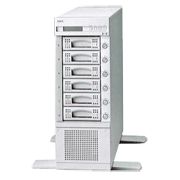NEC announced in July 1998 the DS450, a small disk array unit that offered high reliability and large storage capacity at an affordable price along with support for Windows NT’s Microsoft Cluster Server (MSCS).
- Features of the DS450:
- (1) High reliability in a small disk array
- Although being a small disk array — defined as having ten or fewer hard disks — the DS450 worked with Windows NT cluster systems and provided the fault tolerance and high reliability of larger disk arrays by having fully redundant controllers, power supplies, fans, and hard disks.
- (2) Affordability
- The DS450’s cost per GB was 34 percent cheaper than existing models.
- (3) Large storage capacity in a compact enclosure
- Although only 17.8 x 49.5 x 60 centimeters in size (deskside model), the DS450 could hold up to 35 GB of data in its maximum configuration of six 9 GB class hard disks.
- (4) High performance
- The Ultra SCSI host interface (Wide SCSI also supported) enabled maximum data transfer speeds of 40 MB per second. The cache memory could be expanded up to 128 MB.
- (5) NEC’s own high availability technology
- NEC limited performance drops caused by transient errors by including a function that avoided delays in responses to the host computer when a hard disk experienced temporary problems.
- (6) Multifunctional
- The following functions simplified the operation and maintenance of a highly reliable disk array unit according to the user’s preferences.
- RAID-0, RAID-1, RAID-5 selectable
- Supported hot spare, which keeps a hard disk in reserve for continuous operation
- Supported an optional battery backup function, which saved data in the write cache in the event of a power failure
- The standard equipped LCD panel indicated faults and various settings
- Came with the RaidPlus+ management utility for making settings regarding the detection and reporting of array unit faults
NEC also offered a rack mountable model in addition to the normal deskside model for easier integration in users’ rack systems.
| Parameter | Specification |
|---|---|
| Interface | Ultra SCSI (Wide also supported)(differential) |
| Storage capacity (in a RAID-5 array) | Minimum configuration: 〜18 GB (three 9 GB class hard disks) Maximum configuration: 〜35 GB (five 9 GB class hard disks) |
| Number of hard disks | Up to 6 |
| Data transfer speed | Up to 40 MB/s max |
| Number of LUNs | Up to 2 (in a RAID-5 array) |
| Up to 2 (in a RAID-5 array) | RAID-0, RAID-1, and RAID-5 |
| Data block length | 512 bytes/block |
| Redundant components | Controller, power supply, fan, hard disk module |
| Hot swapping | Yes (for redundant components) |
| Hot spare (hot standby) | Yes |
| Cache / buffer memory | 16 MB standard, 128 MB max. |
| Cache protection | Provided with a battery backup unit (sold separately) |
| Power supply | 100 — 240 VAC, 50/60 Hz |
| Fans | 3 |
| External dimensions [mm] | Deskside: 178 x 495 x 600 (w x d x h) Rack mount: 480 x 177 x 600 (w x d x h) |
| Weight | Deskside: 〜38 kg Rack mount: 〜32 kg |


